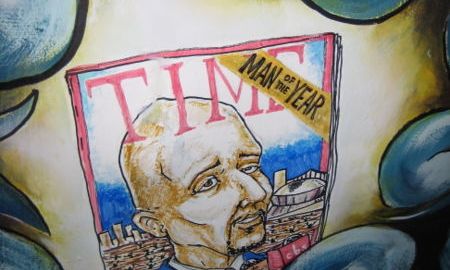Treme Pleasures Itself

I’m no TV critic. My best TV watching days were over twenty years ago. But a slot on my blog here might as well be reserved for my weekly thoughts on the new HBO show Treme, because it is one of the few times during the week that you will find me in front of the tube. This week’s episode, like the others before it, did not disappoint, although there are a couple of minor quibbles I have with the show. You know you’ve watched a great episode when you are still viewing an hour long show an hour and fifteen minutes later, because you have had to rewind several scenes a few times to finally hear the dialogue after laughing so hard the first time and second and third times you see them that you drown the sound of the actor’s voices out. All I can say is, if my name was Ray Nagin, I would not be a happy camper this week.
A few episodes into the season, Treme has me hooked. The writer Creighton and I are having a mind meld. The trombonist Antoine and I are trading choice profanities sotto voce, the way two guys who’ve known each other a long, long time do. Even wildman Davis strikes a chord with the anarchist in me, the nascent rebel presence that hides behind my breastbone, as crazy as he is. The only character among the main players that appears to be totally useless is Sonny, the street musician slash drug addict who always looks like he needs to be disinfected and deloused. I look at the segments he and his girlfriend, Annie the violinist, as break time—time to go to the bathroom, time for a beer, time to rearrange my stock portfolio, as nonexistent as it is—you get the picture. As cute as Annie is, they could write these two out of the show next week and I wouldn’t miss them, especially if losing their storyline meant more airtime for the three main narratives driving the show.
It is the nuances that endear this HBO production to you, especially if you are a writer, who may understand more than most how much what you choose to display affects what a viewer takes away from a scene. If Antoine Batiste’s girlfriend Desiree is acting, she deserves the highest award it is they give to best actresses on cable TV shows, because she hasn’t hit a false note from the beginning. Janette Desautel, the chef, poignantly struggles with the frailty of a recovering economy post-Katrina. Surprisingly, “a desperate man for desparate times” Davis McLary seems to be slowly becoming seduced by his own image as he ramps up his wacky bid for New Orleans city council. And Albert Lambreaux, the always serious “Big Chief”, appears to be getting his mojo back, flashing his first genuine smile of the season.
Here I need to confess—all of this descriptive prose in these preceding three paragraphs was actually a warm up, a literary drum roll of sorts, because the only reason I really wrote this piece today was to have the chance to describe for you the end of the episode. You have to see it to believe it, and even then, if you are like me, it will take many, many rewinds to fully appreciate the subversive nature of a parade float called “Nagin’s Wet Dream”. The papier mache replica of the former New Orleans mayor, which depicted a half dressed Ray Nagin lying back in a reclining position while a mechanism in his pelvic area simulated the motions of masturbation, has got to be one of the most overtly visceral political statements made by a popular TV series since The West Wing was on.




